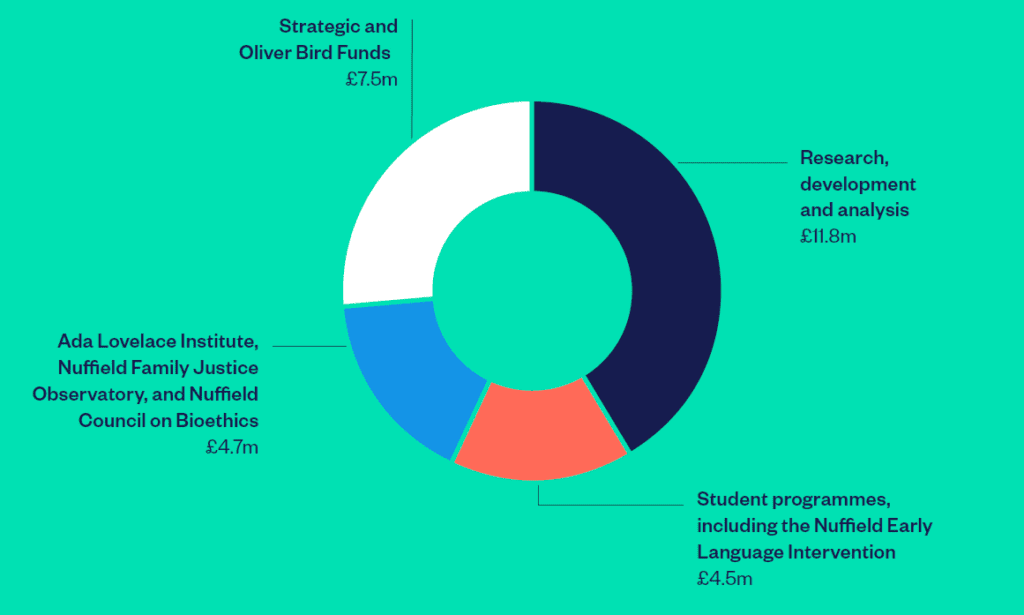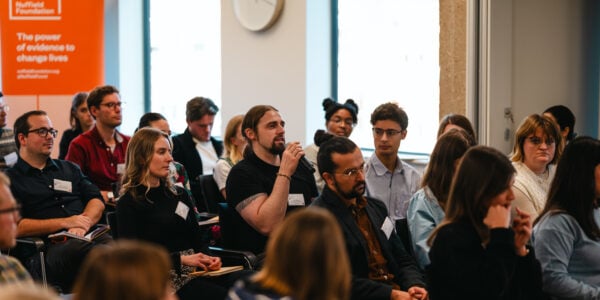In 2021, we spent £28.5 million on charitable activities to advance social well-being and educational opportunity in the UK – the highest in our history. This includes £7.2 million for three projects from our Strategic Fund that will address some of the major challenges facing our society in the coming decades.
2021 highlights
- Our flagship oral language programme, the Nuffield Early Language Intervention (NELI) is now being used in two-thirds of primary schools in England. Over 90,000 reception-age children will benefit from additional support with vital speech, language and communication skills as part of the government’s education recovery programme.
- Our Education projects provided a valuable evidence base for further action to counter the effects of educational disruption caused by the pandemic. Dr Sarah Cattan’s work showed that 40% of children did not meet the government’s minimum guidelines for learning time during the second lockdown. Caroline Sharp’s National Foundation of Educational Research (NFER) project revealed that school leaders reported an increase in incidents of self-harm by pupils and a lack of emotional and academic readiness among students transitioning between key educational stages.
- Covid Realities – a participatory online research project led by Dr Ruth Patrick – gave a much-needed voice to parents and carers living on low incomes during the pandemic. Evidence from the project was influential in the government’s decision to extend the £20 uplift in Universal Credit for an additional six months.
- We published four evidence reviews from our Changing face of early childhood series, accompanied by a programme of events and stakeholder engagement. The series has sparked debate both in the media and in Parliament, particularly in relation to increases in poverty for families with young children and the dysfunction evident in the early years education and care system.
- Research led by Professor Amanda Sacker found increasing inequalities in some outcomes between people who have spent time in local authority care as children and those who had not. For example, early death rates rose from being 40% higher in 1971 to 360% higher in 2001 for adults who had spent time in care. The research was subsequently referenced in the Case for Change published as part of the Independent Review of Children’s Social Care.
- The IFS Deaton Review of Inequalities continued to provide insight on issues such as gender, social mobility and ethnicity, attitudes to inequalities, and trade. The Review found, for example, that people from ethnic minority backgrounds who were born and brought up in the UK do much better in the education system than the White majority, but this does not translate fully into success in the labour market. Evidence from the Review has been referenced 46 times in Parliament.
Highlights from our in-house centres
Ada Lovelace Institute
- Ada’s evidence reviews and policy briefings contributed to decision‑making on vaccine passports, including the government’s measured approach to implementation.
- Ada’s research into algorithmic accountability and AI regulation influenced thinking in the UK Cabinet Office, the Office for AI, Ofcom and the NHS AI Lab.
Nuffield Family Justice Organisation
- New judicial guidance about which family court cases should be heard remotely once social distancing restrictions are lifted, has been informed by the Nuffield FJO’s research and recommendations.
- The Nuffield FJO is catalysing change in the way that contact between children and their birth families is supported after adoption, by using insights from research to develop a prototype digital tool now being piloted across England.
Nuffield Council on Bioethics
- The Nuffield Council on Bioethics’ inquiry on the potential use of genome editing in farmed animals played a significant role in prompting the government to reconsider and revise its approach to facilitating genome editing in livestock.
- Four years after the Nuffield Council on Bioethics recommended that children and young people should not be able to access cosmetic procedures unless medically recommended, the government has enacted The Botulinum Toxin and Cosmetic Fillers (Children) Act 2021, restricting access to Botox and cosmetic fillers for under 18s.
In 2021 we built upon our initial response to the pandemic as its ongoing impact became enmeshed with other challenges facing our society, such as inequality across multiple dimensions, disruption to the education of our young people and the rising cost of living.Professor Sir Keith Burnett, Chair of the Nuffield Foundation
How we spent it
- £11.8 million expenditure on research, development and analysis projects, including £9.3 million for projects across our core domains of Education, Welfare and Justice.
- £7.5 million expenditure on our Strategic Fund for ambitious research projects and our Oliver Bird Fund to improve the lives of people living with musculoskeletal conditions.
- £4.5 million on student programmes, including the Nuffield Early Language Intervention.
- £4.7 million on running the Ada Lovelace Institute, Nuffield Family Justice Observatory and the Nuffield Council on Bioethics – independent bodies we have established to examine areas central to our research agenda.
- At the end of 2021, we were managing 186 research, development and analysis projects with a total value of £35.9 million.

Looking ahead
- In 2022 we will award funding to projects developed through Understanding Communities, our research and policy collaboration with the British Academy designed to identify practical solutions to support local communities in the UK.
- In partnership with Versus Arthritis, we will fund a new collection of projects to improve the lives of people living with MSK conditions.
- We will publish the final report from our Changing face of early childhood series.
- We will begin a new project to improve the experience of people who apply to us for funding.
- We will continue to build an inclusive organisation with a shared identify, underpinned by the principles of collaboration and autonomy.
- We will develop a small number of research associate opportunities for early career researchers that support our core research domains and forge links across the Nuffield Foundation.
The pandemic brought to the fore growing levels of inequality and disadvantage in the UK. This has always been the focus of our previous work, but these issues now have an insistent urgency in the public conversation and are the core of our mission to advance social well-being.Tim Gardam, Chief Executive of the Nuffield Foundation
Our 2021 annual report presents the work we have undertaken towards achieving our strategic goals and publishes our accounts for the year.

















































